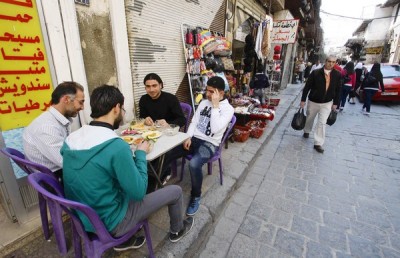By Alexandra Sandels

The rotund bar owner labels the rebels baltajiya, or bandits, who are ravaging towns and villages. Demonstrators want only change and freedom, replies a young man in a hooded sweat shirt. Others wrangle over the president and the uncertain future.
It is a striking scene for a tightly controlled police state. Syria is a nation where citizens have, for decades, risked arrest for publicly criticizing the government. After a year of rebellion across much of the country, Damascus is still an island of relative calm, but things are not like before.
The wall of fear appears to have cracked, at least partially, even as President Bashar Assad retains power and his security forces continue to attack protesters and armed combatants.
“Now people talk politics,” said Farah, a young activist who, like others, uses a single name for security reasons. “People just don’t care anymore. You can sit in a cafe and hear people talk about the opposition. A couple of years ago in a cafe you would have started to whisper when you talk about such subjects; now you talk loudly.”
At a hotel cafe, Sara, a young journalist, has belittled Assad’s professed reform process, without concern that others can hear her.
“People are protesting in the streets defying bullets and snipers,” she said. “Why should one be afraid to say a couple of words?”
Still, fear persists. Few people want their real names used for publication. The threat of being reported to the secret police remains a constant. Thousands have been arrested.
Tremors of the uprising have spread ever closer to the center of Damascus. Last month, thousands of protesters marched through Damascus’ Mezzeh district, not far from government offices. Last week, a firefight broke out in the same neighborhood, a rare occurrence in the capital.
Although the urban hustle and bustle remain, an increasingly tense and eerie feeling permeates the air. Portraits and photos of Assad have become more visible, as have billboards with Syrian flags urging unity and warning against division and fitna, or sedition. A series of car bombings in Damascus, the most recent on March 17, has accentuated the sense of insecurity.
Feelings about the rebellion are decidedly mixed. Some who attended early demonstrations a year ago urging government reform say they no longer go, voicing disappointment that the movement evolved from peaceful protests into an armed conflict. Others say the transition was inevitable.
“This regime will continue to kill if nobody stops it,” said Anwar Bunni, a human rights lawyer who recently finished a five-year prison term for statements he made about Syria. “If everybody went into the street, the regime will kill all the people…. The thing I am most afraid of is if the regime stays. Then people will die quietly. Now at least they die in front of the world.”
But the government still maintains a core of support, especially among those who fear chaos or a radical Islamist takeover if Assad is overthrown. Christians and other minority group members are especially worried.
“There is no revolution, only armed criminal gangs,” said Ali, a small-business owner in his 40s. “They are trying to spur divisions among Christians and Muslims. The army must fight them.”
Inside Mohammed’s souvenir shop in the old market, conspiracy theories flow.
“It’s a battle for Syria over who … will get the biggest cut of the pie,” Mohammed said. “Qatar and Saudi Arabia do not act by choice and conviction. They are inspired by someone else to do what they do, namely the West.”
Despite the turmoil, the government endeavors to keep up appearances. Public service announcements on billboards encourage the use of recyclable nylon bags instead of plastic ones. Trendy cafes, restaurants and nightclubs remain packed on weekends.
Some residents appear to live in a state of denial, even as the rebellion has entered its second year.
One woman, wearing pancake makeup and a down jacket with a fur collar, says as she enters her car, “There is nothing to worry about in the city.” Asked about the uprising, she quickly changes the subject and starts talking about how she is en route to buy a puppy, a “baby dog,” from a breeder.
But the cracks in the facade have become more obvious by the day. Shortages are chronic. Along some streets and roads, colorful gallon-size jugs for fuel are lined up; the wait for a refill is a long one. Daily electricity outages last several hours in the heart of the capital, and as long as 12 hours daily in the suburbs. More and more residents say they stay home at night because of the precarious security situation.
With international sanctions mounting, the economy is in shambles, business owners say. The old market, the souk, once a bustling tourist magnet, is largely deserted. A shop owner shows a logbook filled with blank pages and says the economy is not “bad — it’s nil.”
Authorities have placed concrete blocks and sandbags outside military buildings. Plainclothes police officers in black pants and pointy shoes patrol nearby, Kalashnikovs slung over their shoulders.
Among many people, the fear remains deeply rooted.
Adel, a grocery store owner in his 50s, says he long supported the government because of the stability it brought to Syria. But with worry in his eyes, he recounts how he hasn’t heard from his 20-year-old son since he was arrested two months earlier. Adel is hesitant to ask about his son’s fate: If he inquires, he worries that security men will come and arrest more family members.
“They [the regime] view people like my son like a cockroach,” he says. “His mother cries every day.”
Los Angeles Times

Leave a Reply
You must be logged in to post a comment.